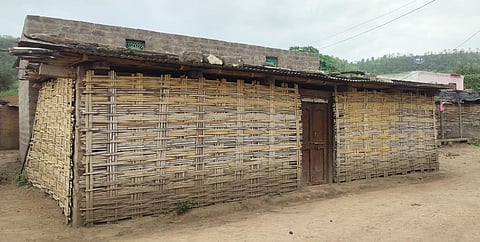

VADGONDI (ASIFABAD) : “Penda daya te tirisi vaathom” (Thank God, she came back safely), said Siva (name changed) in Gondi, with a sigh of relief. “No other girl should face such trauma, such hardship, such agony,” he added.
Siva was referring to his daughter Asha (name changed) who was finally home, having been rescued from the clutches of traffickers after a year.
She was last seen at the Jainoor bus stand, after visiting her sister for Holi in March last year. Her disappearance remained a mystery until recently, when a chance phone call led to her rescue from Madhya Pradesh.
According to her family, Asha was trafficked by a man trusted in the village — 60-year-old police constable Kameri Haridas. Known locally for offering farming loans and supplies, Haridas allegedly took Asha to his room in Asifabad, confiscated her phone and jewellery and confined her. She was then sold through a network of brokers operating between Kumurambheem Asifabad district and Madhya Pradesh for Rs 1.3 lakh.
From Asifabad, Asha was passed between several handlers before ending up in Mandsaur, Madhya Pradesh. There, she was forcibly married to Ghanshyam Prajapat, a mason. With no means of communication, she was unable to contact her family, who began to fear the worst.
A call that helped the family trace Asha
Vadgondi, 28 km from the district headquarters, lacks proper road connectivity and is cut off by a seasonal river that becomes impassable during the monsoon. Most homes are built from bamboo and tin sheets, a reflection of the area’s poverty. Asha’s family had no clue about her whereabouts until a government-issued Aadhaar card led them back to her.
Prajapat, the man who had bought and married Asha, updated her Aadhaar details using his mobile number. When the new Aadhaar card arrived at Asha’s home village, her brother-in-law Shankar (name changed), the only person in the household with secondary education, decided to call the listed number.
The first time he called, a man answered in Hindi, a language the family did not speak. Weeks later, he tried again. This time, after some confusion, a female voice came on the line. “Hoi, koy”, the voice said in Gondi, their native tongue. It was Asha.
The call brought her family relief, but also revealed the depth of her distress. Siva instructed Asha how to send her location through WhatsApp.
However, when the family approached the Asifabad police, they were met with suspicion. Officers accused them of having sold their daughter and refused to register a case. “We told them to arrest us if that were true,” said Siva. Only then did the police register a case and begin investigations.
A team was dispatched to Madhya Pradesh with support from local authorities. When Ghanshyam Prajapat’s brother brought Asha to the police station, she told officers clearly, “I do not want to live with him.” She was allowed to return home.
The investigation uncovered a wider trafficking network involving multiple brokers and intermediaries. At the centre of it was constable Haridas, who allegedly used his position and familiarity with local communities to target vulnerable women. So far, 10 people, including Haridas, have been arrested.
Tribal rights organisations have demanded action from the State government. “In the last six months alone, over 60 tribal women have gone missing from the erstwhile Adilabad district,” said Kova Vijay Kumar, district president of Adivasi Hakkula Porata Samithi (Thudum Debba). “If the police are involved, who will protect our women?” He called for the application of the SC/ST (Prevention of Atrocities) Act and a thorough investigation into all trafficking cases in the region.
Vadgondi continues to lack basic infrastructure, but for Asha’s family, her return has brought a sense of justice. “We don’t have roads or phones. But we have Asha. That is enough,” said Siva.
‘I never thought I would see my parents again’
Now that you have returned home, how do you feel?
Asha: I thought I would never see my home again. I could not understand their language. I was alone and afraid.
Did you meet any other women from the erstwhile Adilabad district there?
Asha: I saw another trafficked woman from Kudtha village during my stay in Mandsaur. But she disappeared the next day, and I never saw her again.
What happened after the marriage in Madhya Pradesh?
Asha: My ‘husband’ was a mason. He made me work as a construction labourer. I worked as a daily wage worker for almost a year.
Why did you go along with constable Haridas?
Asha: He is known to all the villagers and used to help us. That was why I went with him.